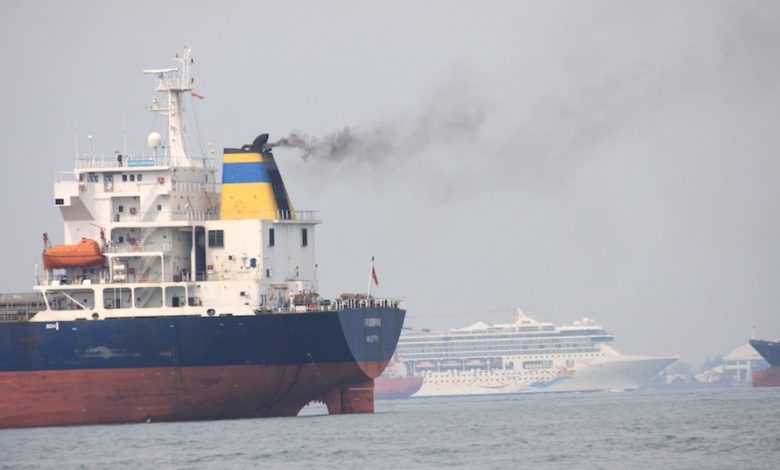Shipping takes aim at aviation’s emissions

Now that shipping has been set its first ever CO2 reduction targets the sector has taken a swipe at its aviation cousins who remain the last large unregulated greenhouse gas emitter.
Speaking last week at the annual Summit of Transport Ministers hosted by the OECD International Transport Forum in Leipzig, Simon Bennett, deputy secretary general at the International Chamber of Shipping (ICS), commented: “As well as being consistent with the 1.5 degree climate change goal, the IMO targets are far more ambitious than what has so far been agreed for aviation, or indeed the commitments made by governments with respect to the rest of the global economy under the Paris Agreement.”
ICS is the largest trade association in shipping, representing all sectors and trades and over 80% of the world merchant fleet.
In April this year IMO member states voted to slash shipping’s CO2 emissions by half by 2050 from levels recorded in 2008.
Commenting on the remarks, Bill Hemmings, director of aviation and shipping at NGO Transport & Environment, told Splash: “The IMO decision calls for shipping to decarbonise through in-sector emissions cuts of at least 50% by 2050. This is indeed a good start. Yet ICAO [the aviation equivalent of the IMO] and the aviation sector ignore the decarbonisation concept and cling to the idea of buying offsets in other sectors.”
Hemmings argued that offsetting can no longer make sense for aviation as the Paris Agreement requires all countries to act themselves.
The timeline for ICAO’s carbon offsetting scheme – called CORSIA – is to cover at least 90% of the international aviation with a carbon offsetting scheme from 2027.
“In the absence of a binding global target for emissions from aviation, there is a question of how countries will meet the goals set out by the Paris Agreement. While many countries have already included domestic aviation emissions in their respective national emissions trading systems, more action is needed on a national and regional level,” commented Jagoda Egeland, project manager for aviation and infrastructure planning at the International Transport Forum.
“Globally, I don’t expect that we will see a global aviation target anywhere on the horizon anytime soon,” Egeland predicted.
The global aviation industry is responsible for over 800m metric tons of carbon emissions annually—higher than the national CO2 output of all but five individual countries. And the carbon impact of aviation is expected to increase rapidly. According to a study by the European Parliament environment committee, left unchecked, aviation is on target to increase contributions to global CO2 emissions from today’s 3% to 22% by 2050.
The Carbon War Room, an NGO which was founded by airline tycoon Sir Richard Branson among others nine years ago, has been vocal in getting shipping to reduce its emissions. As per aviation, its stated goal at the moment is to help 10% of the North American and European commercial aviation and jet fuel market switch to sustainable aviation fuel by 2025.
Splash is still waiting to hear replies from ICAO and IATA, ICS’s aviation counterpart.
Also of note in the speech given by Bennett last week was his belief that the IMO targets “can realistically only be achieved with the development and global roll out of genuine zero CO2 fuels”.
“To be clear, zero CO2 fuels means radical and as yet unproven technologies such as hydrogen fuel cells using ammonia or methanol or batteries powered using renewable energy. While LNG or biofuels will play an important part in the transition we only really see these as interim solutions that won’t deliver the ambitious targets which IMO has now set for 2050,” Bennett said.
https://t.co/4tUxAtGdrd all in hand @birgitliodden! Perhaps without the same results YET but team working hard! 😉
— Alisdair Pettigrew (@alai_pettigrew) April 17, 2018

Nice to see ICS is proud that shipping’s target references the Paris agreement – as it should be. But important to remember the deal will only be consistent with Paris if an action plan is agreed a the next MEPC that sees early and decisive action to implement the initial strategy and follow this ambition throughout the development of the IMO Roadmap. Its still 1.5 to stay alive for us here in the Pacific and we will remain vigilant